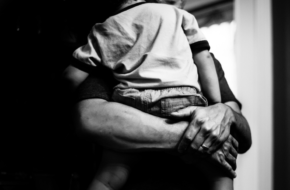I concluded part 1 of this blog post: “Now that we have established why it is important to build a good relationship, let’s talk about how to do that.”
Introductions
I always introduce myself the same way every time I meet a new birth parent: “Hello, my name is Eleanor; I am your son’s/daughter’s/children’s foster mom. I’m sorry to have to meet you like this because this must be a hard time for your family. Your son/daughter/children (insert comment about a positive trait here).”
Let’s break this down:
First, I use the words “foster mom” right away—I have had birth parents say things such as, “Oh, you are the lady watching my kids,” or assume this is a paid “job” for me—so I make certain to introduce the idea immediately that I am the person mothering their children right now. We are going to be co-parenting these kids for the foreseeable future, so let’s be clear on our roles right away.
Second, I acknowledge that this is a difficult situation. Whatever has happened up to this point, there is no question it’s a challenging time for everyone involved. Showing empathy for the family makes you seem less of an enemy.
Third, in making a positive comment such as “Your son has such an infectious smile,” you establish the fact that while you are mothering or fathering the child at the moment, you also want to be clear that this is their child. As far as the compliment, well, what parents don’t want to hear nice things about their kid? Besides, being friendly never hurts when meeting people the first time.
Photo album
The first time I meet parents I show up with a small dollar-store photo album to give them. I always ask the caseworker first if this is okay—and if there are safety issues I need to be aware of.
I include a photo of our family (if safe to do so), a photo of our house (again, if safe to do so), a photo of the child’s bedroom, our playroom, our pets and so on. In the early days, I always try to get a few photos of the kids playing or eating or involved in similar activities and include those. I work really hard to make sure I have at least one photo in which the child is smiling!
I used to not include photos of the kids being held or cuddled by us (I always assumed it would be upsetting to the birth parents to see photos of their child being held by someone else) and then had one mother tell me that she was afraid her son was not being loved while we had him. I immediately showed her all the photos on my phone of him being held, cuddled and rocked and she felt much better, so now I include those photographs, too.
While children are with me, I keep printing photos and taking them to visits. Plus, I scribble notes on the back about what we have been doing and what the kids have been up to each week. If my children were not living with me, I know I would wonder what their days looked like, so I try to make sure parents know what their kids are up to.
Crafts/Artwork
If your foster child is in preschool or school, you should have an abundance of craft projects coming home. I take one or two to each visit and give them to the parents. Kids love showing off their work!
Holidays
For Mother’s Day, Father’s Day, Christmas and so on, I help my foster kids make a small gift or buy something small for them to give to their parents. Most parents are touched to receive something and most kids really enjoy giving gifts.
For the child’s birthday and Christmas I normally take a small gift in my bag to the visit that falls closest to the holiday. If the birth parents did not bring anything to the visit, I let them know I have something in my bag for them to give their child if they would like to.
I have had birth parents burst into tears at this point because they just didn’t have the extra money to buy anything for their child and are so happy to have something to give.
I once had a fellow foster parent tell me I was enabling the birth parent, but I disagree. Most birth parents have all kinds of enormous tasks to complete, which can include finding housing, getting a job, completing rehab or attending parenting classes, so having money and time to buy their child a gift can be just one too many tasks for the week.
And it doesn’t take much effort for me to pick up an additional small gift; often, this kindness will go a very long way.
Don’t take it personally
All birth parents with whom I have worked have, at some point, critiqued the way I was caring for their child. One didn’t like the brand of diapers I was using; another insisted I must be neglecting to change her son because he had a (slight) diaper rash. One mom got upset that I had juice for the child in the diaper bag, while another was concerned I didn’t have juice on hand for her to give her child.
I figure it’s not about me.
This parent has almost no control over their child’s life, so they seek it where they can. I smile and tell them I hear them, but I don’t rush out and buy a new brand of diapers or run to the store for juice boxes. Their concern or anxiety is not typically about diapers or juice anyway.
Ask the parents about their child
Parents know a lot about their kid, how they go to sleep, what their favorite television show is, what they like to eat and so on—so ask!
In doing so, you will learn important information about the child you are parenting while also acknowledging the birth parents’ role in their child’s life. They are probably not feeling amazing about themselves or their identity as parents right now, so acknowledging they know a lot about their child they can teach you will be validating to them.
Boundaries
Sometimes, maintaining a positive relationship means setting good, firm boundaries. If parents are given my phone number or manage to get hold of it and start texting or calling constantly, I politely but firmly tell them that I am busy caring for their child and we will talk at the next visit. Your social worker can help you with setting boundaries if you need to, but I often find that having a frank but polite chat solves most issues.
Sure, it’s not always been smooth sailing with every birth family, but for the most part we have been able to build positive and respectful relationships with our foster and adopted kids’ parents, grandparents and even extended family.
It has not always been easy and has sometimes involved a lot of tongue-biting on my part—but it has been 100% worth the effort!
—Eleanor Delewski, Diakon Adoption & Foster Care parent
(A final note about language: for a child who has been adopted, the commonly accepted terms are “parent” for the adoptive parents and “birth” or “first parents” for the child’s original parents. However, for a child in foster care, “parent” typically refers to the birth parent, with “foster parent” being used for the moms and dads caring for the child while he or she is in foster care. For clarity, the term “birth parent” is used in this blog post to refer to the foster child’s original parents, but I fully recognize that while a child is in foster care the birth parents are still the legal parents of the child. Not everyone agrees on what language should be used for which parent, but that is a debate beyond the scope of this post.)





